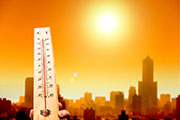- Could Your Grocery Store Meat Be Causing Recurring UTIs?
- Are You Making This Expensive Thermostat Error This Winter?
- Recognizing the Signs of Hypothyroidism
- 10 Strategies to Overcome Insomnia
- Could Artificial Sweeteners Be Aging the Brain Faster?
- Techniques for Soothing Your Nervous System
- Does the Water in Your House Smell Funny? Here’s Why
- Can a Daily Dose of Apple Cider Vinegar Actually Aid Weight Loss?
- 6 Health Beverages That Can Actually Spike Your Blood Sugar
- Treatment Options for Social Anxiety Disorder
Cities Are Getting Hotter, New Research Reports


The number of heat waves has risen over the past 40 years, particularly in urban areas, a new study says.
Researchers analyzed data from 217 cities around the world and found that between 1973 and 2012 the number of heat waves increased significantly in 48 percent of them. Only 2 percent of the cities had a large decrease in heat waves.
“Our findings suggest that urban areas are experiencing a kind of double whammy — a combination of general climatic warming combined with the heat island effect, wherein human activities and the built environment trap heat, preventing cities from cooling down as fast as rural areas,” said study co-author Dennis Lettenmaier. He is a geography professor at the University of California, Los Angeles.
“Everything’s warming up, but the effect is amplified in urban areas,” he said in a university news release.
The researchers also found that nearly two-thirds of the cities had large increases in the number of extremely hot nights.
“The fact that the trend was so much stronger at night underscores the role of the heat island effect in urban areas,” Lettenmaier said.
“You have heat being stored in buildings and in asphalt, concrete and other building materials, and they don’t cool down as quickly as they would outside of the urban area. This effect was likely exacerbated by decreasing wind in most of the urban areas,” he explained.
The study was published recently in the journal Environmental Research Letters.
More information
The U.S. Centers for Disease Control and Prevention has more about extreme heat.
Source: HealthDay
Copyright © 2026 HealthDay. All rights reserved.










